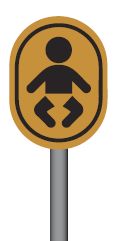
What would you say if I told you that a high number of baby products contain toxic chemicals? What if I told you those toxic chemicals were in the form of flame retardants that are used in things like nursing pillows, car seats, changing pads and bassinet pads? And what if I said there is currently nothing in the law protecting us from these harmful toxins?
I wish I could say I made this up – that this whole thing is a ridiculous April fools joke, but a new report entitled Hidden Hazards in the Nursery shows that 85% of baby products tested in a study by the Washington Toxics Coalition and Safer States contain toxic flame retardants. Children and families are exposed to these toxins, called Tris chemicals, when they escape from household items and contaminate dust and indoor air. Young children are the most affected because they are more likely to ingest dust by playing on the floor and they often put their hands and toys directly in their mouths.
I’ll try not to get overly scientific, but the most prevalent flame retardant found by the new study is called Chlorinated Tris. This toxin was voluntarily removed from children’s pajamas in the 1970’s when it was discovered that it can cause adverse health effects. Most recently California listed Chlorinated Tris as a carcinogen (cancer causing substance). So, in unscientific terms, a chemical that was found to be hazardous to our children’s health was removed from children’s clothing back in the 70’s but has made its way into other children’s products we use frequently.
The great news is that there are companies that do not use these toxic flame retardants which demonstrates that products can be manufactured in a way that is less hazardous to our children’s health (Baby Bjorn, Boppy and Orbit Baby are known to not use Tris flame retardants).
It’s really unfathomable that our government does not do more to protect the health of our children and families. It’s infuriating that while you may have made a conscious decision to breastfeed your child to enhance your baby’s immune system (a very healthful thing to do) you may unwittingly be exposing your new baby to hazardous toxins if you’re using certain breastfeeding support pillows. This is an outrage.
As busy working moms, how are we supposed to find the time to research every single product we give our children (not to mention the products we use on their skin)? The answer is: we can’t. We rely on our government to keep us safe and somewhere along the line there’s been a clear failure.
Children’s health advocates are calling on the Washington State Legislature to pass the Toxic-Free Kids Act, which would ban the use of toxic Tris flame retardants in children’s products beginning July 1, 2014. For more information about this campaign click here.
Locally, I represent the Permanent Commission on the Status of Women (PCSW) on the Coalition for a Safe and Healthy Connecticut. We joined the coalition because so many environmental issues disproportionately impact women and children, toxic Tris chemicals being a great example. The long-term vision of the coalition is to create a toxic-free Connecticut, where consumers no longer have to think twice about what’s in our products.
Helpful documents:
This blog was originally written for Working Mother Media



The views and opinions expressed in this post are those of the author(s) and do not necessarily reflect those of MomsRising.org.
MomsRising.org strongly encourages our readers to post comments in response to blog posts. We value diversity of opinions and perspectives. Our goals for this space are to be educational, thought-provoking, and respectful. So we actively moderate comments and we reserve the right to edit or remove comments that undermine these goals. Thanks!